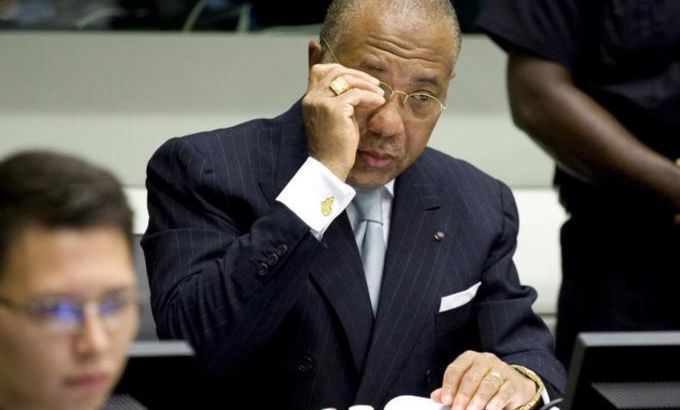War crimes court finds Charles Taylor guilty
Decision on former Liberian leader is first ever judgement of a former African head of state by an international court.

A UN-backed international court has convicted former Liberian president Charles Taylor of war crimes – the first African head of state to be found guilty by an international tribunal.
Taylor, 64, was charged with 11 counts of war crimes including murder, rape, conscripting child soldiers and sexual slavery during intertwined wars in Liberia and Sierra Leone, in which more than 50,000 people were killed.
| Charges | |||||||||||||||||||||||
|
The Special Court for Sierra Leone, in the Hague, the Netherlands, found him guilty of all of the charges on Thursday.
“The trial chamber unanimously finds you guilty of aiding and abetting [all of these] crimes,” presiding judge Richard Lussick said in court.
Lussick then read out the eleven charges, including acts of terrorism, murder, rape, sexual slavery, enslavement, conscripting child soldiers and pillage.
According to the court, Taylor, who was president of Liberia from 1997 to 2003, supported and gave orders to Revolutionary United Front (RUF) rebels in the 11-year civil war in neighbouring Sierra Leone that killed about 50,000 people.
“[According to the court] he was an aider, an abetter and a planner,” Al Jazeera’s Barnaby Phillips said from outside the court in the Hague.
“He was not, however… the mastermind, the boss, the overall commander, of the RUF.
“RUF military commanders did not necessarily see themselves as subordinate to Charles Taylor,” our correspondent said.
Sierra Leone’s information and communication minister, Ibrahim Ben Kargbo, said the conviction was “the biginning of the end of a very long journey”.
The prosecution said that the RUF undermined a ceasefire agreement in 1999, prolonging the war for another three years, and that Taylor financed their war effort from the proceeds of “blood diamonds” mined illegally in Sierra Leone.
“The Taylor verdict is a watershed moment, however it turns out,” said Richard Dekker, head of the international justice programme at Human Rights Watch.
“As president, Taylor is believed to have been responsible for so much murder and mayhem which unfolded in Sierra Leone. His was a shadow that loomed across the region, in the Ivory Coast, in Sierra Leone and Liberia.”
Taylor has denied the charges.
Prosecution challenge
The courts have earlier convicted RUF fighters of crimes against humanity, including rape, torture and terrorism.
Civilians were mutilated during the conflict, their arms being cut off above the hand [known by fighters as “long sleeves”] or above the elbow [“short sleeves”].
|
Victims of the civil war in Sierra Leone speak to Al Jazeera’s Yvonne Ndege |
Trial witnesses described seeing children and pregnant women being shot, disembowelled or mutilated in a process aimed at creating terror in the civilian population.
But the challenge was to link Taylor to these crimes.
“The accused never set foot in Sierra Leone when these crimes were being committed. He never directly, physically committed these crimes,” Brenda Hollis, the court’s chief prosecutor, told the Reuters news agency.
“In a domestic case, you have to prove there was a murder, we have the added level of proving linkage.”
Taylor is likely to appeal the verdict, but if the court sentences him in May as planned, he will serve his prison sentence in Britain.
The location and category of the prison will depend on the details of the verdict and sentencing.